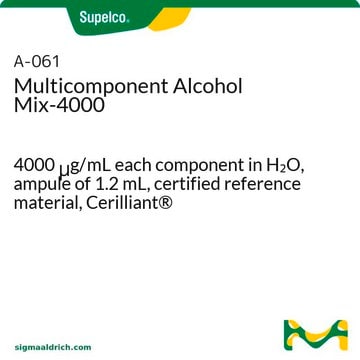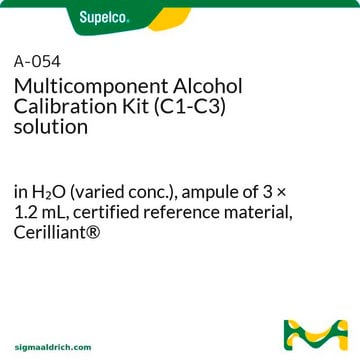E-053
Ethanol-500
500 mg/dL in H2O, ampule of 10 × 1.2 mL, certified reference material, Cerilliant®
Synonym(s):
Ethanol solution, Ethyl alcohol
About This Item
Recommended Products
grade
certified reference material
Quality Level
form
liquid
feature
Snap-N-Spike®/Snap-N-Shoot®
packaging
ampule of 10 × 1.2 mL
manufacturer/tradename
Cerilliant®
concentration
500 mg/dL in H2O
technique(s)
gas chromatography (GC): suitable
liquid chromatography (LC): suitable
application(s)
forensics and toxicology
format
single component solution
storage temp.
2-8°C
SMILES string
CCO
InChI
1S/C2H6O/c1-2-3/h3H,2H2,1H3
InChI key
LFQSCWFLJHTTHZ-UHFFFAOYSA-N
Looking for similar products? Visit Product Comparison Guide
General description
Application
- Catalysis in green chemistry: Ethanol-500 was utilized as a solvent in the green synthesis of substituted Chromeno[4,3-b]quinolone, demonstrating its application in promoting environmentally friendly chemical reactions without the use of harmful solvents (Sayahi et al., 2021).
- Method development in clinical biochemistry: Ethanol-500 is used in the development and validation of a high-performance liquid chromatography (HPLC) method for determining alpha-tocopherol in human erythrocytes, showcasing its utility in precise and critical clinical measurements (Solichová et al., 2003).
Legal Information
related product
Storage Class Code
10 - Combustible liquids
WGK
nwg
Flash Point(F)
Not applicable
Flash Point(C)
Not applicable
Certificates of Analysis (COA)
Search for Certificates of Analysis (COA) by entering the products Lot/Batch Number. Lot and Batch Numbers can be found on a product’s label following the words ‘Lot’ or ‘Batch’.
Already Own This Product?
Find documentation for the products that you have recently purchased in the Document Library.
Customers Also Viewed
Our team of scientists has experience in all areas of research including Life Science, Material Science, Chemical Synthesis, Chromatography, Analytical and many others.
Contact Technical Service




